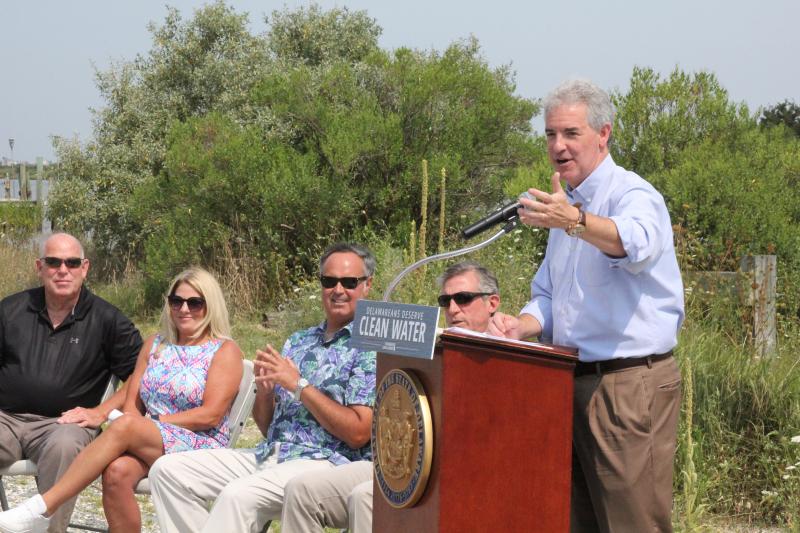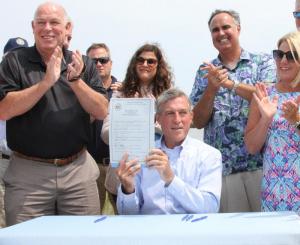Delaware Clean Water Act signed into law

Leading up to the signing of Delaware’s Clean Water Act July 22, Gov. John Carney recalled a clean water planning session held 30 years ago at the same spot in Lewes.
“The main issue has always been funding,” he said. “Where are you going to get the money?”
With a sweep of his pen, he signed a new law with its funding mechanism, the Clean Water Trust, designed to fix a host of water issues that have plagued communities for decades. The trust is funded by $50 million from the 2022 budget that will go to fund projects to improve drinking water and wastewater infrastructure, and enhance water quality in ponds, lakes, rivers and streams throughout the state.
Speaker of the House Rep. Pete Schwartzkopf, D-Rehoboth Beach, shared his story dating back to 1978 when he saw firsthand the poor water quality in the Ellendale community.
“And here we are still talking about water,” he said. “But we’re going to fix it.”
The Clean Water for Delaware Act will provided infrastructure for drinking water, stormwater and wastewater, and covering programs for drainage, waterway management and beach preservation, and many other water-related projects funded by separate state and federal resources among them the conservation reserve enhancement program, conservation cost-sharing and tax ditches. One of the major environmental openings is the Act’s support of the Governor’s Clean Water Initiative for Underserved Communities that is part of the Department of Natural Resources and Environmental Control’s work with the state’s low-income, underserved communities.
“I want to recognize Carney, Representative Longhurst and the entire General Assembly, and all stakeholders for their support in giving DNREC additional tools to help the state realize the goal of Clean Water for all Delawareans,” said DNREC Secretary Shawn M. Garvin. “With this legislation, through the Clean Water Trust, we will be able to bring more resources to bear and more partners to the table to address the water challenges of our state. And though the Governor’s Clean Water Initiative, state agencies, particularly DHSS and DNREC, are in a position to lift those who until now might have been thwarted by circumstances, costs or lack of community governance structure from their right to safe drinking water and proper wastewater treatment.”
The Act also contains a passage that “it is important that priorities for clean water projects in this state be given to projects that utilize green infrastructure and enhancement of natural systems to provide ecological benefits that improve water quality, demonstrate a high ratio of nutrient or pollution reduction to the amount of funding, and improve of community resilience to extreme weather, sea level rise, and other climate impacts.” Language for creating of the Clean Water Trust is explicit that “Existing federal and state funding resources alone are inadequate to meeting the state’s current and future demand for clean water projects.”
Sen. Ernie Lopez, R-Lewes, commended the bipartisan effort that went into passing the clean water law.
“If you look down the list ... it was so many people of the General Assembly,” he said.
Melissa Steele is a staff writer covering the state Legislature, government and police. Her newspaper career spans more than 30 years and includes working for the Delaware State News, Burlington County Times, The News Journal, Dover Post and Milford Beacon before coming to the Cape Gazette in 2012. Her work has received numerous awards, most notably a Pulitzer Prize-adjudicated investigative piece, and a runner-up for the MDDC James S. Keat Freedom of Information Award.






















































